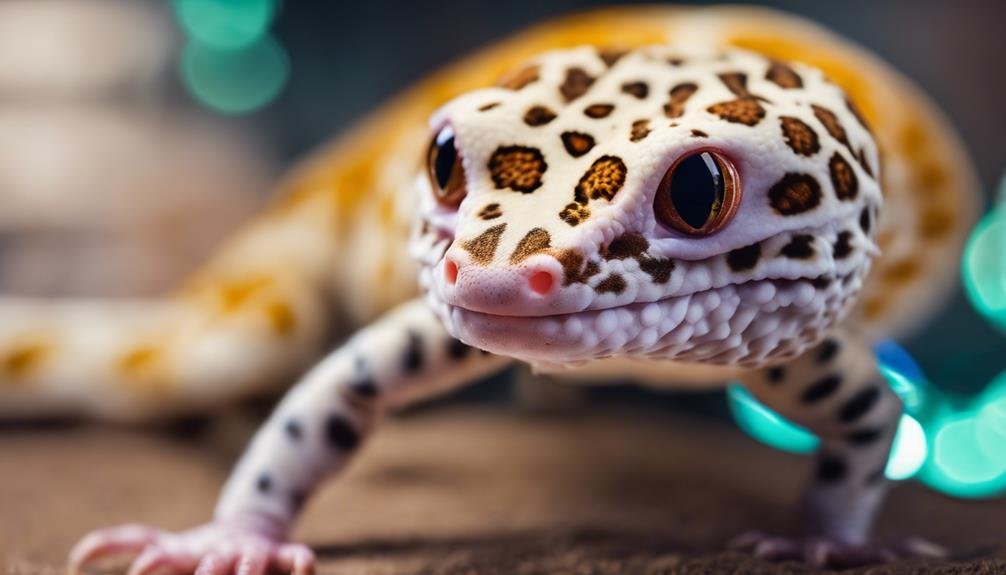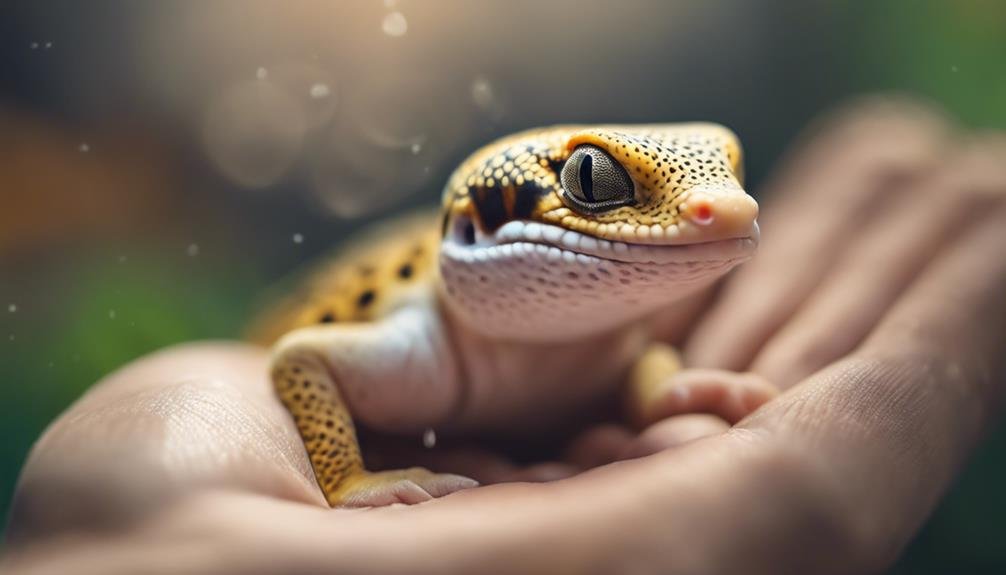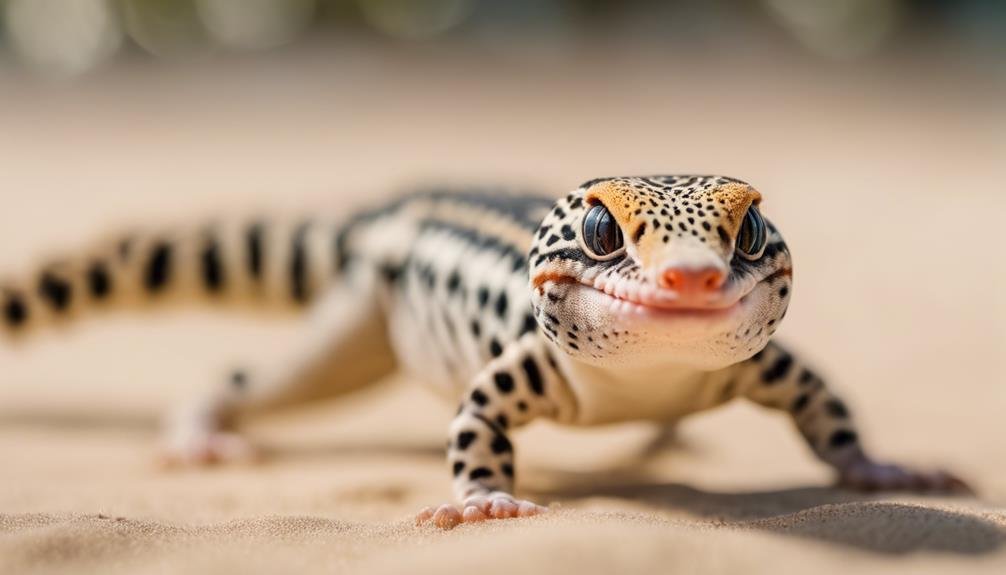If you’ve ever witnessed your leopard gecko performing a distressing death roll, you might be dealing with Enigma Syndrome, a condition that’s as mysterious as it sounds. This genetic disorder, particularly prevalent in the enigma morph, can manifest in seizures and a host of other worrying symptoms. You’re likely searching for answers and, most importantly, solutions. Recognizing the early signs, such as head tilting and erratic behavior, is your first step towards providing the care your pet desperately needs. But what exactly causes Enigma Syndrome, and how can you manage its symptoms to make sure your gecko leads a happier, healthier life? The path to understanding and support begins with uncovering the complexities behind this condition.
Key Takeaways
- The death roll in leopard geckos indicates severe neurological dysfunction, often linked to Enigma Syndrome.
- Enigma Syndrome affects cognitive functions, leading to disorientation, seizures, and the death roll phenomenon in leopard geckos.
- Management of affected geckos includes reducing stress, securing a calm habitat, and consulting a specialist reptile vet for tailored care.
- Early signs of distress, such as erratic behavior and head tilting, should prompt immediate attention to prevent severe symptoms.
- Veterinary interventions may include anti-epileptic medications and dietary adjustments to support the health of geckos with Enigma Syndrome.
Understanding Enigma Syndrome
Enigma Syndrome is a genetic disorder that disrupts the balance and cognitive functions of leopard geckos, causing severe symptoms like disorientation and seizures. This condition primarily affects the enigma morph leopard geckos, though it’s important to note that other morphs carrying the enigma gene can also exhibit symptoms of this disorder.
You might be wondering how widespread this issue is. Well, Enigma Syndrome isn’t just a rare anomaly; it’s a recognized concern within the pet community, especially among those who breed or keep leopard geckos.
One of the most challenging aspects of Enigma Syndrome is its management. Since there’s no definitive cure, you’re left to focus on making life as comfortable as possible for your affected gecko. This includes managing symptoms and trying to minimize environmental stressors that could trigger or worsen the condition. It’s a delicate balance, requiring patience and understanding from you as the pet owner.
Understanding Enigma Syndrome is the first step towards providing compassionate care for geckos facing this disorder, emphasizing the importance of awareness and responsible breeding practices to mitigate its impact.
Symptoms and Diagnosis
Recognizing the signs of Enigma Syndrome in leopard geckos, such as the alarming death roll and frequent seizures, is essential for timely diagnosis and care. If you notice your gecko displaying uncontrolled rolling movements or experiencing seizures, it’s important to understand these could be symptoms of Enigma Syndrome. These behaviors are distressing and point to underlying neurological issues that need immediate attention.
Observing your gecko for erratic behavior is the first step in diagnosing Enigma Syndrome. Here’s a quick guide to help you identify the key symptoms:
| Symptom | Description | Enigma Syndrome Relation |
|---|---|---|
| Death Roll | Uncontrolled rolling movements | Direct symptom |
| Seizures | Sudden, uncontrolled electrical disturbances | Common in affected geckos |
| Erratic Behavior | Unusual actions or movements | Indicator of issues |
Understanding the link between these symptoms and Enigma Syndrome is vital. Once you’ve noticed any of these signs, seeking veterinary guidance is imperative. A professional can confirm the diagnosis through observation and recommend care and management strategies to support your gecko. Remember, early detection and intervention can make a significant difference in managing Enigma Syndrome effectively.
Genetic Factors Explained


You’ve learned about the symptoms and diagnosis of Enigma Syndrome in leopard geckos, but you might wonder where it all starts.
The answer lies in their DNA, where the enigma gene plays a critical role in causing the syndrome’s neurological issues.
Now, let’s explore the genetic roots and inheritance patterns that contribute to this condition.
Genetic Roots Unveiled
Genetic analysis has revealed that the root cause of Enigma Syndrome in leopard geckos stems from a specific gene mutation affecting brain cell function. This discovery, pivotal in the field of Enigma Genetics, highlights a loss of function mutation that’s central to the syndrome.
The mutant gene leads to the production of misfolded proteins, disrupting the normal functioning of brain cells in affected geckos. Despite the disorder’s dominant nature, breeding unaffected Enigma geckos can result in healthy offspring.
However, the complexity of Enigma Syndrome’s genetic underpinnings necessitates further research and testing to unravel the full extent of how this mutation influences the condition and to explore potential avenues for intervention and management.
Inheritance Patterns Discussed
Understanding the inheritance patterns of Enigma Syndrome in leopard geckos is essential, as it follows an autosomal dominant pattern. If you’re considering breeding leopard geckos, knowing that affected geckos can be either heterozygous or homozygous dominant for the Enigma gene is vital.
This means that offspring have a 50% chance of inheriting the gene if one parent is heterozygous. On the flip side, homozygous recessive geckos don’t show any signs of the syndrome, indicating they’re completely normal.
To mitigate the effects and spread of Enigma Syndrome, it’s recommended to breed unaffected individuals from diverse gene pools. This strategy aims to reduce the likelihood of producing offspring with this condition and safeguards the health and well-being of these beloved reptiles.
The Death Roll Phenomenon
You’ve learned about the genetic factors behind Enigma Syndrome.
Now it’s time to focus on the Death Roll Phenomenon. Recognizing the signs of death roll is essential, as it’s often linked to neurological issues that can severely affect your gecko’s health.
We’ll explore the underlying causes and discuss how to manage Enigma Syndrome effectively, ensuring your pet’s well-being.
Identifying Death Roll Signs
In order to effectively recognize the advanced stages of Enigma Syndrome in your leopard gecko, it’s important to identify the signs of the death roll phenomenon. This behavior is a clear indication of neurological dysfunction and should prompt immediate concern and action.
- Rolling onto its back: The gecko may start rolling onto its back unexpectedly and seemingly without control.
- Spinning in circles: Along with rolling, the gecko might spin in circles, indicating severe neurological distress.
- Head tilting: A noticeable tilt to the head can be a precursor to more severe symptoms.
- Star gazing: Staring upwards or in odd directions, often coupled with the above behaviors, points towards neurological issues related to Enigma Syndrome.
Recognizing these signs is important for the health of your gecko.
Underlying Causes Explained
To understand the root of the death roll phenomenon in leopard geckos, it’s essential to explore the genetic disorder known as Enigma Syndrome, which disrupts their balance and cognitive functions. This condition often leads to erratic and uncontrolled spinning movements, known as death rolls, causing potential injuries and distress in affected geckos.
Seizures can trigger these behaviors, further complicating their condition and highlighting the severity of Enigma Syndrome. Recognizing the death roll behavior is vital, as it signifies the challenges posed by this neurological disorder.
Managing Enigma Syndrome
Understanding the underlying causes of Enigma Syndrome sets the stage for effectively managing the condition and mitigating the death roll phenomenon in leopard geckos. Seizures and death rolls, as distressing symptoms, require a tailored approach to care. Here are key strategies to manage the condition:
- Minimize Environmental Stress: Keep their habitat calm and stable.
- Monitor Health Closely: Regular check-ups can catch issues early.
- Understand Triggers: Learn what exacerbates the death rolls to avoid these situations.
- Provide Specialized Care: Tailor your care to the unique needs of geckos with Enigma Syndrome.
Managing Seizures
Managing seizures in leopard geckos with Enigma Syndrome requires reducing environmental stressors to provide a calm habitat. It’s essential to create a space that minimizes triggers for these vulnerable pets. By offering a secure and serene environment, you’re taking a significant step in seizure management. This approach doesn’t just mitigate the symptoms but also contributes to a better quality of life for your gecko.
Regular monitoring and attentive care are indispensable for managing this condition effectively. Keeping a close eye on your pet allows you to recognize the early signs of distress and intervene promptly. It’s also vital to maintain a routine that includes checking for any potential hazards in their living space that could provoke stress or seizures.
Consulting with a specialist reptile vet is a pivotal part of seizure management. A vet with expertise in reptile health can provide tailored care strategies that address the unique needs of your gecko. They can offer advice on specific adjustments to your pet’s habitat and care routine, ensuring you’re equipped to support your gecko’s health thoroughly.
Care Strategies for Affected Geckos


After discussing how to manage seizures in leopard geckos, let’s focus on specific care strategies for those affected by Enigma Syndrome. If your leopard gecko is diagnosed with Enigma syndrome, providing a supportive and tailored environment is important for their well-being. Here are key strategies you should implement:
- Isolate affected geckos: To prevent injury and avoid stress from interactions with other geckos, it’s important to house them separately. This ensures a calm and safe environment tailored to their unique needs.
- Create a secure habitat with appropriate hides: Design their living space to reduce stress and promote comfort. Include multiple hides to offer security and privacy, which is crucial for their mental well-being.
- Offer a mealie dish for easy access to food: Ensure they’ve easy access to food with a mealie dish. It’s important to maintain a diet high in calcium and supplements to support their health.
- Consult with a specialist reptile vet: Regular consultations with a vet specializing in reptiles can provide tailored care recommendations and help monitor their condition effectively.
These care strategies are pivotal in managing Enigma syndrome, aiming to enhance the quality of life for your affected leopard gecko.
Veterinary Interventions
How can veterinary interventions help your leopard gecko suffering from Enigma Syndrome, especially when it comes to managing death rolls and seizures? When your pet starts exhibiting these alarming symptoms, it’s important to seek specialized veterinary care. Experts in reptile health can offer a lifeline for managing Enigma Syndrome more effectively.
Veterinary interventions typically focus on symptom management to enhance your gecko’s quality of life. For geckos experiencing seizures, anti-epileptic medications may be recommended. These drugs aim to reduce the frequency and severity of seizures, thereby minimizing the risk of injury during death rolls. However, it’s not just about medication. Your vet will also guide you in adjusting your pet’s environment to prevent triggers of these distressing episodes.
Consulting with a vet who specializes in reptiles is essential for developing a tailored care plan for your gecko. They’ll consider the unique needs of your pet, ensuring the strategies implemented are as effective as possible. Remember, the goal of veterinary interventions isn’t just to treat the symptoms but to improve your leopard gecko’s overall well-being despite Enigma Syndrome.
Supporting Your Gecko’s Health


To support your gecko’s health, especially when dealing with Enigma Syndrome, it’s crucial to provide a stress-free environment and make sure they receive proper nutrition and care. This condition can lead to challenging symptoms, including seizures and the alarming death roll behavior. However, you can take several steps to minimize stress and support your gecko’s well-being.
Here are some key strategies:
- Consult a Specialist Reptile Vet: Regular check-ups with a vet who specializes in reptiles can offer tailored advice and treatment options for managing Enigma Syndrome.
- Create a Secure Habitat: Ensure the enclosure has wide hide entrances and secure spaces to prevent stress, a common trigger for seizures.
- Monitor Nutrition: A diet high in calcium and essential supplements can bolster neurological health, potentially reducing the severity of Enigma Syndrome symptoms.
- Reduce Stress: Keep the environment calm and consistent to help decrease the likelihood of death rolls and seizures.
Can Enigma Syndrome and Seizures in Leopard Geckos Be Similar to Venomous Symptoms in Corn Snakes?
While Enigma Syndrome and seizures in leopard geckos may share some similarities with venomous symptoms in corn snakes, there are no actual concerns about corn snake venom. These differences in reptile health issues should be carefully studied and understood by reptile owners and enthusiasts.
Frequently Asked Questions
How Do You Treat Enigma Syndrome in Leopard Geckos?
To treat Enigma Syndrome in leopard geckos, you’ll focus on supportive care. This means reducing stress in their environment, possibly assist-feeding those struggling to eat, and keeping a close eye on their condition. It’s all about making their life as comfortable as possible.
You should also consult with a specialist reptile vet for tailored care recommendations. Remember, there’s no cure, so your goal is to manage symptoms and improve their quality of life.
Why Did My Leopard Gecko Have a Seizure?
Your leopard gecko might’ve had a seizure due to several factors, including Enigma Syndrome, which affects balance and cognition. This genetic disorder can make them more susceptible to seizures, especially when stressed. It’s important to minimize stressors in their environment to prevent these episodes.
Seizures can be distressing and may lead to uncontrollable spinning or flipping, known as death rolling. Creating a calm, stable environment is key to managing their condition.
How Long Do Enigma Leopard Geckos Live?
You’re likely wondering about the life span of Enigma leopard geckos. Generally, they live between 6 to 10 years in captivity. However, with exceptional care, some may live even longer.
The key factors affecting their longevity include genetics, their living environment, and overall health. To maximize their life span, you should guarantee regular vet check-ups and provide a suitable habitat that caters to their unique needs and potential health issues.
How Do You Tell if Your Leopard Gecko Is an Enigma?
To tell if your leopard gecko is an Enigma, you’ll need to look for specific signs. Watch for unusual behaviors like star gazing, head tilting, and difficulty catching prey. These could suggest your pet carries the Enigma gene.
For a definitive answer, consider genetic identification through testing. It’s not just about observing odd movements; genetic testing confirms if your gecko has the Enigma gene, giving you clarity on its condition.
Conclusion
You’ve learned about the complexities of Enigma Syndrome, from its symptoms and genetic underpinnings to the alarming death roll and seizure management.
Now, it’s important to focus on creating a calm environment, staying vigilant for early signs of distress, and seeking specialized vet care.
By adopting tailored care strategies and providing unwavering support, you can make a significant difference in your leopard gecko’s life, ensuring they enjoy the best possible quality of life despite this challenging condition.


